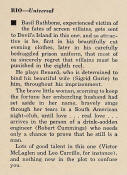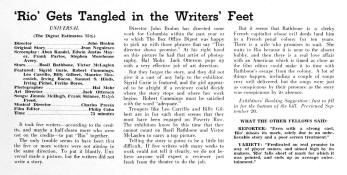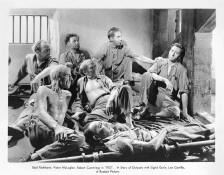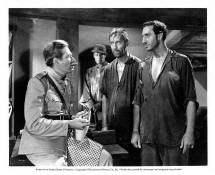Rio
|
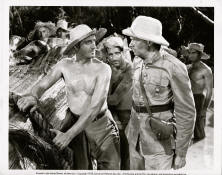 Reynard is forced to labor at the St. Jacques Island penal colony. |
 Reynard complains about the prisoners who are too weak to work. |
"Yarn is of a made-to-order variety for Rathbone, giving him excellent opportunity to exhibit his unique ability of playing at the same time sympathetic and unsympathetic parts. Despite his cruel coldness, which goes so far as murdering his partner in escape from prison, he creates considerable feeling for himself." —Variety, October 4, 1939
|
Basil Rathbone, experienced victim of the fates of screen villains, gets sent to Devil's Island in this one, and so attractive is he, first in his beautifully cut evening clothes, later in his carefully bedraggled prison uniform, that most of us sincerely regret that villains must be punished in the eighth reel. He plays Reynard, who is determined to bind his beautiful wife (Sigrid Gurie) to him, throughout his imprisonment. The brave little woman, scorning to keep the fortune her embezzling husband had set aside in her name, bravely sings through her tears in a South American night-club, until love ... real love ... arrives in the person of a drink-sodden engineer (Robert Cummings) who needs only a chance to prove that he still is a man. Lots of good talent in this one (Victor McLaglen and Leo Carrillo, for instance), and nothing new in the plot to confuse you. —Hollywood, December 1939 |
"[Rio is] a well made melodrama ... Rathbone scores heavily ... Cummings ... received applause last night for his work. He should move a lot nearer the top after this performance." —John L. Scott, Los Angeles Times, September 21, 1939
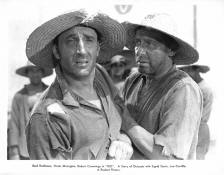 Reynard is desperate to get back to his wife. |
 |
 Reynard waits anxiously for a letter from Irene. |
 "No woman will wait ten years for a man!" |
"Though he plays a thoroughly unsavory character, Basil Rathbone ends up the most sympathetic person in the film, and as such he's the only real reason to sit through the melodramatic convolutions of Rio." —Hal Erickson, All Movie https://www.allmovie.com/movie/v108022
"This is Rathbone's picture in many ways and he labors mightily to give it sinister significance. With customary skill he manages at the same time to create some sympathy for the unsavory Reynard." —Movies and the People Who Make Them, November 10, 1939
"Basil Rathbone gives distinction to 'Rio' as long as the plot allows him to do so. As a scamp and financier, a kind of Kreuger, he has a role suited to his style; when eventually the plot drags him not to suicide but to the swamps and fevers of a French prison camp near Rio de Janeiro, he suggests little more than an emaciated golem. Mr. Rathbone belongs to the civilized and urbane centres of the world, not to the jungles." —John Mosher, The New Yorker, November 4, 1939
|
The significance of the title of this mild melodrama of a money and marriage mixup is difficult to interpret from the picture's thesis. true, a great part of the play's action transpires in the South American city of Rio de Janeiro, but outside of some cabaret and carnival scenes the story could have been deposited in any other situation. An array of upper bracket names and talent has been assembled for the histrionic lineup but the opportunities are few. Basil Rathbone and Victor McLaglen have roles that could be very well executed by performers of less valuable abilities. Sigrid Gurie regulates her performance along the stylization of an harassed heroine of the early days. Robert Cummings is less sprightly than usual—perhaps it was the mustache. John Braham directed from a screen play by Stephen Morehouse Avery, Frank Partos, Edwin Justus Mayer and Aben Kandel. "Reynard" is sentenced to a French penal colony off South America for forgery and embezzlement. To be near him, his wife, "Irene," and his semi-valet and bodyguard, "Dirk," make headquarters in Rio de Janeiro. "Irene" finds employment as a cafe singer and a bit of unwelcome romance from "Bill Gregory," an American engineer, who is having an uneven battle with his conscience and a case of acute alcoholism. The pair fall in love finally, which partly accounts for "Gregory's" stand on the water wagon. In the meantime, "Reynard" has been reported killed in attempting an escape. The husband makes his expected entrance as the romantic pair are arranging marital plans. In attempting violence on his successor, "Reynard" is at last placed on the deceased list. J. F. C. —Motion Picture Herald, October 14, 1939 |
"Rio (Universal) is a bravely reburnished, expertly tinkered new version of an old story." —Time, October 9, 1939
 Paul and friend Mushy struggle to make it through the jungle. |
 Paul kills Mushy and switches ID tags. |
 Paul threatens both Irene and Mr. Gregory. |
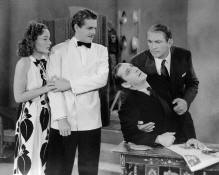 Reynard dies in Dirk's arms. |
"Despite the lavish production Universal has given it, and despite the efforts of the cast, "Rio" is not a good entertainment, by reason of the fact that the story is preposterous, even though five writers worked on the original story to extract some values from it." —Harrison's Reports, October 14, 1939
See Page Three for pictures of posters, lobby cards and promo photos.







